Announcements
‹View Table of Contents
- Respiratory Virus Season and Health Equity: Information about Respiratory Syncytial Virus (RSV), COVID-19, and Flu Webinar
- Office of Health Equity Announces 2023 Williams-Hutchins Health Equity Award Recipients
- New CDC Office of Health Equity Leadership
- Health and Human Services Invests $8 Million to Improve Health Care Access by Training New Physicians to Care for Individuals with Disabilities and Individuals with Limited English Proficiency
- Health and Human Services Invests $8 Million to Improve Health Care Access by Training New Physicians to Care for Individuals with Disabilities and Individuals with Limited English Proficiency
- Health and Human Services Launches Innovation Challenge to Prevent Human Trafficking Among Women and Girls
- Health and Human Services Invests $11 Million to Expand Medical Residencies in Rural Communities
Respiratory Virus Season and Health Equity: Information about Respiratory Syncytial Virus (RSV), COVID-19, and Flu Webinar
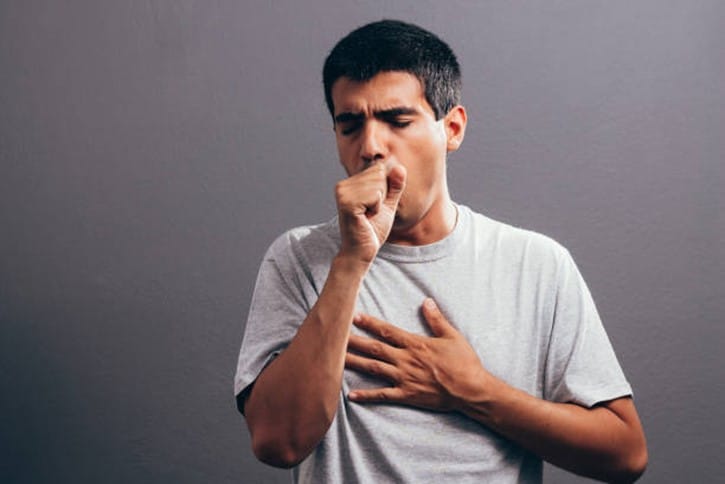
Join CDC’s Office of Health Equity (OHE) to learn about current guidance to protect your communities from COVID-19, RSV, and flu this fall and winter. Topics will include key information about these conditions, prevention and vaccination guidance to help protect groups at highest risk for serious illness, and information about CDC’s efforts focused on health and vaccine equity. Presenters include OHE leadership and subject matter experts from CDC’s National Center for Immunization and Respiratory Diseases (NCIRD).
This live streamed Zoom event will be held on Monday, October 30 at 11:30 am – 12:45 pm ET. More information about this event and how to register is available on the event webpage.
Office of Health Equity Announces 2023 Williams-Hutchins Health Equity Award Recipients
CDC’s Office of Health Equity (OHE) is pleased to announce the recipients of the 2023 Williams-Hutchins Award. The Williams-Hutchins Health Equity Award recognizes exceptional projects from the CDC John R. Lewis Undergraduate Public Health Scholars Program that advance health disparity science and minority health. The award honors the impactful public health careers of Walter W. Williams, MD, MPH, FACPM (CAPT, USPHS, Ret.) and Sonja S. Hutchins, MD, MPH, DrPH, FACPM (CAPT, USPHS, Ret.).
Lewis Scholars work on public health projects in a variety of public health settings during their summer experiences, and present posters on their projects or a health equity topic at CDC. Outstanding student projects from each of the seven institutions currently delivering the Lewis Scholars program were selected for the Williams-Hutchins Award. These projects exemplified exceptional attributes such as new approaches, innovations that improve service to the public, creativity, and efforts beyond the call of duty.
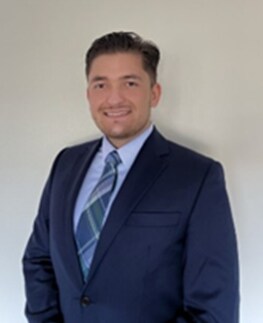
Sebastian Cota was selected from Columbia University’s Summer Public Health Scholars Program (SPHSP), for the project, Evaluating Food Equity in Uptown Manhattan Through Affordability Analysis: Comparing the Price of Groceries in Bodegas and Supermarkets. Seeking to understand ways to prevent food-related chronic disease, Sebastian identified barriers to food equity through an affordability analysis of groceries in Washington Heights, NY. Sebastian’s study compared the price of four grocery items available in 38 Washington Heights bodegas and 40 Uptown Manhattan supermarkets using an independent sample T-test. Results indicated a statistically significant higher price of groceries at bodegas than supermarkets on average. This pilot study provides an opportunity for further research in many areas. Alyssa Sutherland was selected as honorable mention from Columbia University.

Carly Wheeler was selected from Kennedy Krieger Institute (KKI)’s Maternal Child Health Careers/Research Initiatives for Student Enhancement – Undergraduate Program (MCHC/RISE-UP) for the project, Challenges that Impact the Mental, Physical, and Social Health of Newly Arrived Refugees in South Dakota. Carly’s project evaluated the common challenges newly arrived refugees face that result in health disparities within their population through her role at Lutheran Social Services Center for New Americans (LSS CNA) in Sioux Falls, ID. Carly also addressed how community members, health professionals, and social workers could work to improve the overall health of refugee populations. Carly developed and implemented a cultural orientation curriculum that addressed domestic violence, gender roles, and sexual and reproductive health and collaborated with community health workers to educate LSS CNA case managers about effective and respectful medical advocacy. Aaron Johnson was selected as the honorable mention from KKI.
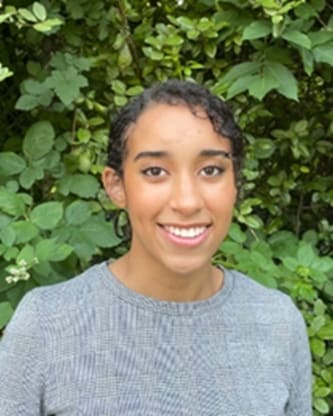
Clarke Avery was selected from Morehouse College’s Project Imhotep for the project, Evaluating Landscapers’ Exposure to Hazardous Air Pollutants from Gasoline-Powered Leaf Blowers. Avery worked with the National Institute for Occupational Safety and Health (NIOSH) to evaluate how extensive use of gasoline-powered lawn and gardening equipment (GLGE) in residential and commercial settings is a prominent environmental and health concern. To conduct this research, the methodology consisted of four steps: literature review, emissions measurement, landscaping employer interviews, and a health risk assessment. The results of this effort are the following: paired t-test comparing gasoline-powered lead blower (GLB) operators and bystanders’ exposure to emissions, health risk assessment for improved capacity building in occupational health policy forecasting, and better support for collaborations related to NIOSH. Further research is needed to explore the implementation of protective measures as means to mitigate the adverse health risks associated with GLB emissions. David Palmer was selected as the honorable mention from Morehouse College.

Aysha-Lynn Estrella was selected from Southern Plains Tribal Health Board’s Tribal Health Experiential Student Internship Seminar (THESIS) for the project, Utilizing Traditional Food Systems to Address Health Outcomes in Native Hawaiians. Aysha-Lynn’s primary objective was to advocate for food sovereignty and outline potential policy changes that can help address high obesity and food insecurity rates in Hawaii. Historical factors, socioeconomic disparities, and the shift towards Western diets have disrupted traditional food systems, which, in turn, have led to adverse health outcomes for Native Hawaiians. The policy suggestions made were informed through research using data analysis and literature reviews. Findings suggest that greater land allocation for the purpose of growing traditional foods could help address obesity and food insecurity rates. Daisy Chavez was selected as honorable mention from Southern Plans Tribal Health Board.
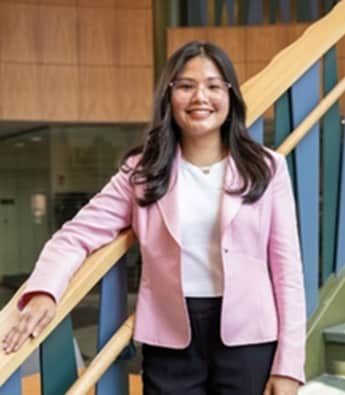
Kristina Serrano was selected from University of Michigan School of Public Health’s Future Public Health Leaders Program (FPHLP) for the project, Investing Power in Youth: Strengthening Health Literacy Through Youth Participatory Action Research (YPAR). The LA VIDA Youth Summer program at the Community Health and Social Services (CHASS) Center is a wellness program where youth are given a safe space to explore and address critical health topics such as teen dating violence, sexual assault, relationships, consent, and more. As a facilitator for this weekly educational program, Kristina explored the impact of health communication and Youth Participatory Action Research (YPAR) to improve health literacy among youth. With research, Kristina curated a YPAR guide for enhanced comprehension of the approach at other community organizations. Placing the needs, interests, and experiences of youth at the center of their health literacy journeys is crucial to ensure that youth have a voice in advancing health equity. Prudny Bonnaire-Fils was selected as an honorable mention from Michigan School of Public Health.

Francisca Centron Seguel was selected from University of Pittsburgh’s Pitt Public Health Undergraduate Scholars Program for the project, The Development of an Evaluation Tool to Inform Youth Gun Violence Prevention Efforts in Pittsburgh. Francisca’s project was to develop and implement a program evaluation tool for Youth Enrichment Services, Inc. (YES)’s Annual Teen Violence Prevention Symposium. The results of the evaluation indicated that youth participants gained a sense of self-efficacy about violence prevention and an overall positive sentiment towards the symposium. This evaluation will contribute to better informing and tailoring future youth gun violence prevention efforts led by YES in Pittsburgh, Pennsylvania. Preti Chowdhury was selected as an honorable mention from University of Pittsburgh.
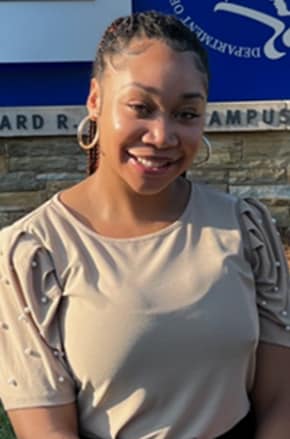
Alexus Mcintosh was selected from University of California, Los Angeles (UCLA)’s UCLA Public Health Scholars Training Program for the project, Community Health Advocate and Student Researcher on WASH (Water and Sanitation, Hygiene) Insecurities among the Unhoused Population in the Event of a Flood. Alexus interned with Dignity Health California Hospital Medical Center to create a health education newsletter for the community. She also worked closely with a team to design, create materials, and implement a new program, “Mind Matters.” In addition to attending lectures and actively participating in classroom discussions, Alexus collaborated with a small group of peers on a health equity project that explored literature on WASH (water and sanitation, hygiene) insecurities among the unhoused population in the event of a flood and provided recommendations on best practices. Kristen Alleyne was selected as honorable mention from UCLA.
Read more about the Williams-Hutchins Health Equity Awards and this and past year’s recipients.
New CDC Office of Health Equity Leadership
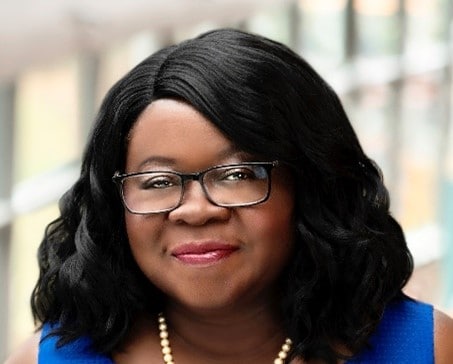
CDC’s Office of Health Equity (OHE) shares that Hazel D. Dean, ScD, DrPH (Hon), FACE, FFPH has been selected to serve as director, Office of Equitable Population Health and CAPT Carolina Luna-Pinto has agreed to serve as acting director, Office of Minority Health.
Since June 2023, Dr. Dean has served as director of the Office of Equitable Population Health in CDC’s Office of Health Equity In this role, she provides leadership in developing CDC’s long-range plans for populations that have been historically marginalized and underserved and who experience a disproportionate burden of premature death, preventable injury and disease. In conjunction with this position, she continues to serve as the 25th Editor-in-Chief of the journal, Public Health Reports (PHR), the official, scientific journal of the Office of the Surgeon General and the US Public Health Service. Under her exceptional leadership, PHR saw notable growth, including the largest journal impact factor increase in its history. In addition, Dr. Dean implemented new equity, inclusion, diversity, and accessibility approaches in journal practices; launched collections of PHR articles on racism and health, emerging viral epidemics, mental health and COVID-19; and established a new department on ethical dimensions of public health that focuses on the translation of and interface between public health ethics theory and practice.
Dr. Dean served in many leadership roles with a distinguished record of service and achievements. She is an international leader in health disparities and health equity research, policy and practice and has continually added to global scholarship on health equity science and policy. She has worked in public health at the local, state, federal, and international levels, and in nonprofit organizations. She previously served as the principal deputy director of CDC’s National Center for HIV, Viral Hepatitis, STD, and TB Prevention (NCHHSTP). In that position, she served alongside the center Director by sharing responsibilities for planning, direction, and management of NCHHSTP and for achieving health impact of public health surveillance, research, and programs for preventing and controlling HIV, viral hepatitis, other sexually transmitted diseases (STDs), and tuberculosis. Prior to this position, she served as NCHHSTP’s first associate director for health equity and director of its Office of Health Equity.
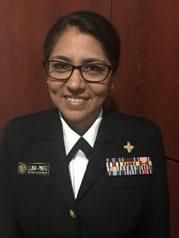
Since July 2022, CAPT Luna-Pinto has held the position of Program Chief for the (former) Office of Minority Health & Health Equity at CDC where she led four teams focused on health equity science, infrastructure and capacity building, strategic initiatives, and providing technical assistance to CDC’s health disparities grant recipients. She is also building the infrastructure for the Office of Health Equity’s emergency response coordination efforts. Prior to joining the now Office of Health Equity, she was the Deputy Branch Chief for CDC’s Emergency Preparedness and Response Branch, which is part of the National Center for Emerging and Zoonotic Infectious Diseases, Division of Preparedness and Emerging Infections. In her various roles at CDC and as a US Public Health Services officer, she has been fortunate to have contributed to the Agency’s mission through steady leadership, quick thinking, creativity, and resilience in many environments, assignments and deployments (e.g., H1N1, Haiti earthquake/cholera outbreaks, 2015 Zika virus outbreak, southwest border responses, MERS/Ebola outbreaks, and COVID-19 pandemic response) as part of the State, Tribal, Local, and Territorial Support Task Force, and in the COVID-19 Chief Health Equity Officer Unit.
CAPT Luna-Pinto will play a critical leadership role in standing up the new office – working collaboratively with the OHE leadership and other CIO and IOD leaders to chart the way forward to an enhanced enterprise-wide strategy for addressing health disparities and health inequities in communities of color, sustaining partnerships with national, state, and local minority-serving organizations, accelerating the implementation of evidence-based strategies that reduce health disparities, and serving as a key advisor on issues associated with improving health outcomes in racial and ethnic populations, among other essential contributions.
The Power of Belonging: Understanding Ableism and Why Addressing It Matters
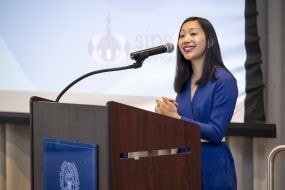
The Rehabilitation Act of 1973 was the first federal legislation to address access and equity for people with disabilities. This September, CDC recognized the 50th anniversary of the passage of the Rehabilitation Act. To honor this major milestone, CDC’s Office of Health Equity and National Center on Birth Defects and Developmental Disabilities co-sponsored a U.S. Department of Health and Human Services (HHS)-wide virtual event, The Power of Belonging: Understanding Ableism and Why Addressing it Matters. The webinar featured Tiffany Yu, disability influencer and disability representation speaker, and was attended by over 1,800 HHS employees.
During the event, speakers shared ways to value and elevate the lived experiences of people with disabilities, amplify disability inclusion in all aspects of public health, and combat ableism. Tiffany Yu defined ableism as, “A system of oppression where we devalue someone based on the way their body and or mind works,” and shared key ways to combat ableism. Furthermore, she guided some attendees along the path toward disability allyship, explaining that “Allyship means asking, ‘how can we ensure that we are placing equitable value on everyone?’” Attendees gained knowledge, shared insights, and considered next steps for prioritizing disability inclusion in their professional and personal lives.
This special event is one of a growing number of efforts at CDC to help public health professionals strengthen their understanding of and comfort with addressing the evolving needs of the disability community. “Achieving a sense of belonging and inclusion requires trust and sustaining relationships. We are committed to working with and supporting the disability community,” remarked CDC Director Mandy K. Cohen, MD, MPH, during her opening remarks. CDC strives to protect the health and wellness of all people, including those with disabilities; this large and diverse group comprises every age, gender, race, ethnicity, sexual orientation, and socioeconomic status. CDC works across public health disciplines to improve disability inclusion and considerations for data monitoring systems, disease prevention and health promotion programs, and emergency preparedness and response efforts to meet the needs of people with disabilities.
Check out more highlights from this event on Twitter at @CDCHealthEquity.
Health and Human Services Invests $8 Million to Improve Health Care Access by Training New Physicians to Care for Individuals with Disabilities and Individuals with Limited English Proficiency
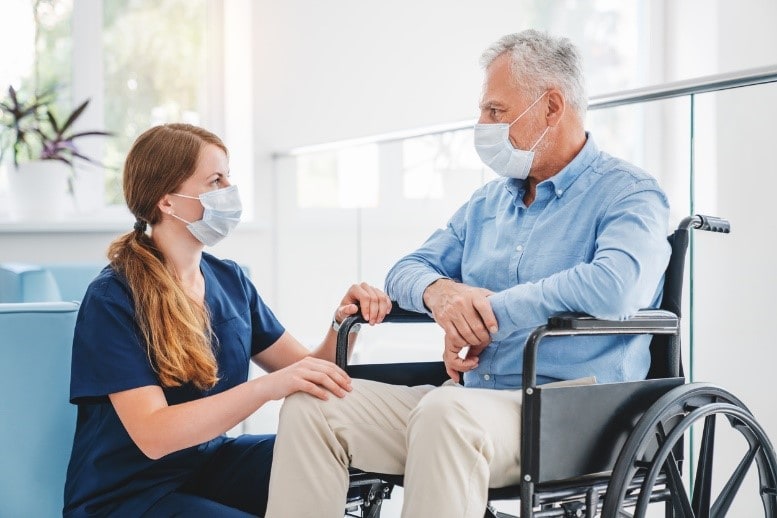
The U.S. Department of Health and Human Services (HHS), through the Health Resources and Services Administration (HRSA), announced more than $8 million through 18 awards to train primary care medical students, physician assistant students, and medical residents in providing culturally and linguistically appropriate care for individuals with limited English proficiency and individuals with physical or intellectual and developmental disabilities. HRSA’s mission focuses on improving health care access for historically underserved communities, and these investments address critical gaps that can occur in health care training and impede access to care.
A 2022 survey of more than 700 physicians found that only 41 percent of respondents were ‘very confident’ about their ability to provide the same quality of care to people with disabilities as those without, and only 57 percent strongly agreed that they welcomed people with disabilities into their practices, leading researchers to conclude that improvements in medical education and training are needed to better prepare physicians to care for people with disabilities.
Individuals with limited English proficiency disproportionately experience poor health outcomes and often substandard provider experiences, including challenges understanding doctors’ questions and diagnoses and with reading and using prescriptions, referrals, and follow-up directions. A 2021 Kaiser Family Foundation survey found that, among Hispanic adults who completed the survey in Spanish, 35% said it is difficult to find a doctor who explains things in a way they can understand compared with 17% of those who completed the survey in English.
Awardees will focus on either disability, limited English proficiency, or both. A full list of awardees is available online.
Health and Human Services Launches Innovation Challenge to Prevent Human Trafficking Among Women and Girls
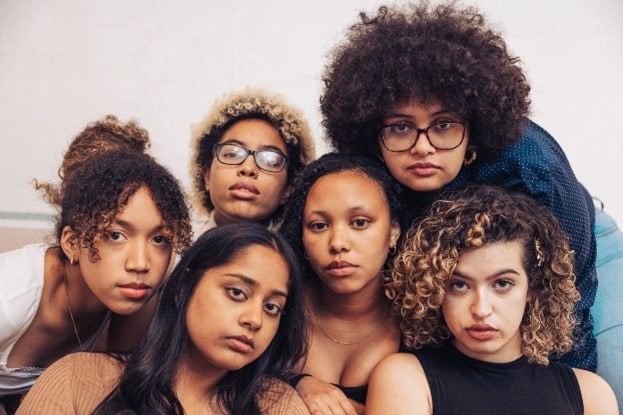
The U.S. Department of Health and Human Services (HHS), through the Office of the Assistant Secretary for Health Office on Women’s Health, is launching a new challenge worth up to $1.8 million to organizations with successful innovative and life-changing approaches to address human trafficking prevention among women and girls in the United States. The challenge was announced at the HHS National Human Trafficking Prevention Summit.
The National Human Trafficking Hotline estimates that 26.7 million people were impacted globally by human trafficking in 2021. Human trafficking is a crime that exploits a person for compelled labor, services, or commercial sex acts. The challenge was created in alignment with the priorities highlighted in the White House National Action Plan to Combat Human Trafficking.
Learn more about this initiative on the HHS website.
Health and Human Services Invests $11 Million to Expand Medical Residencies in Rural Communities
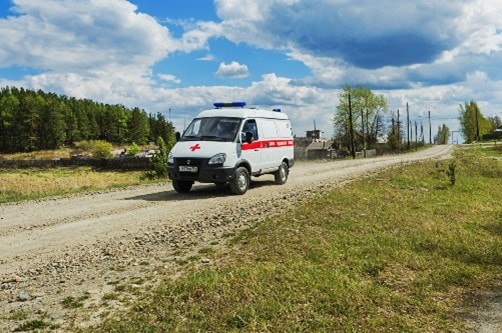
The U.S. Department of Health and Human Services (HHS), through the Health Resources and Services Administration (HRSA), awarded nearly $11 million to 15 awardees to strengthen the health workforce by establishing new residency programs in rural communities.
Nearly 70 percent of areas designated as primary medical Health Professional Shortage Areas are in rural areas. Physician shortages, poverty, and geographic isolation contribute to a lack of access to care and poorer health outcomes for rural Americans. More than half of rural U.S. counties lack hospital obstetric services. In response to the declining access to rural maternal health care, three of the 15 awards will be used specifically to develop new family medicine residency programs with enhanced obstetrical training in rural communities. The Centers for Medicare & Medicaid Services has also been taking critical steps to advance health equity and access to care.
Visit the HRSA website for a detailed breakdown of the awards.